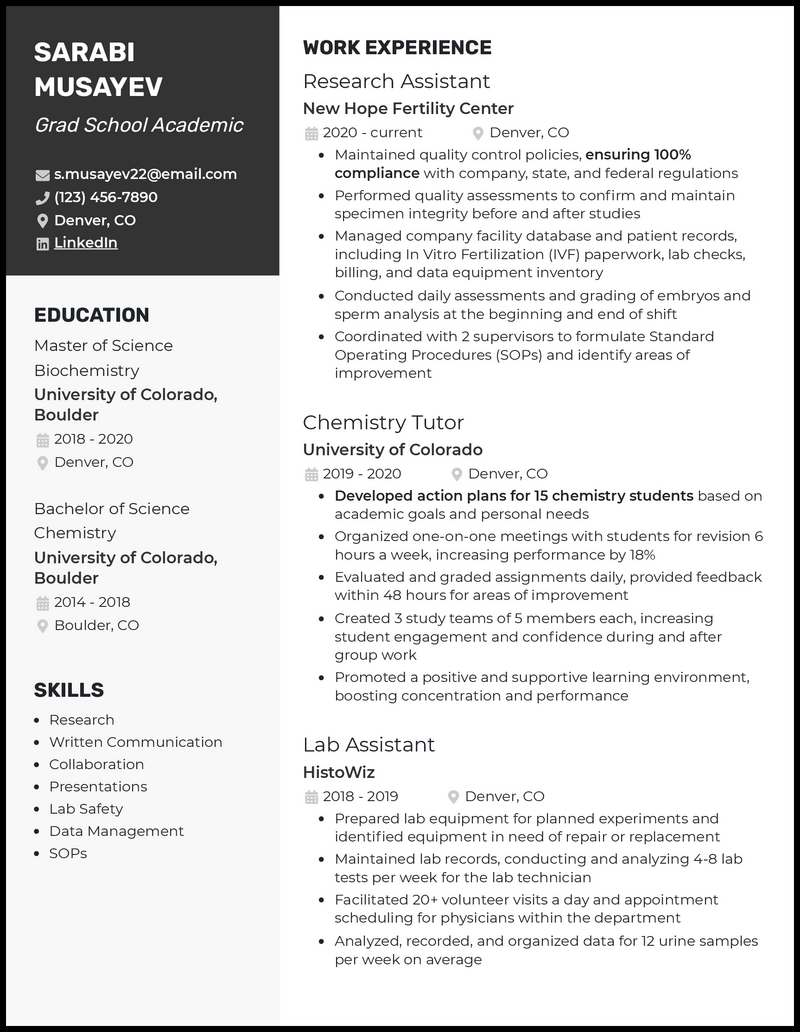While your career is only just getting started, as a grad school academic you already have years of experience with rigorous research, report writing, and teaching. By now, you have likely made contributions to scholarly journals in your field.
Your resume serves as a gateway to the academic world and more opportunities for publication, but it’s not easy to transfer years of research and lecturing onto a one page resume template.
With our meticulously designed grad school academic resume examples and cover letter writing tips in this article, however, you can confidently present your academic journey and find your next research position.
Related resume examples
What Matters Most: Your Research Skills & Academic Experience

Though you are a subject matter expert in a certain field, it’s normal for academics to apply their skills to new areas—meaning your experience won’t always be a perfect match for the position you’re applying for.
In this case, an effective strategy is to focus on your foundational skills as an academic. Try to keep things as technical as possible by listing specific tools, software, and methodologies you use in your work.
With less tangible skills like “teaching” or “collaboration,” make sure to expand on the subject in your work experience points, backing up your claims with specific examples. Better yet, just forego them entirely and pick something more specific that can stand on its own.
9 best grad school academic skills
- Research Methodology
- Academic Writing
- Microsoft Office
- Tableau
- Project Management
- JSTOR
- Public Speaking
- Teaching
- Zotero
Sample grad school academic work experience bullet points
When describing your past roles, including metrics enhances the impact and credibility of your accomplishments. They provide concrete evidence of your achievements, showcasing the value you brought to your research projects.
If you have carried out previous work on the same topic as the role you’re applying for, make sure to include it in your bullet points. Otherwise, any examples of teaching excellence, conference presentations, studies, reports, or research endeavors will be effective.
Try to envision the skills and experience you would draw from to tackle the role in question and use this to inform your experience bullet points.
Here are a few examples:
- Co-authored a research paper published in a peer-reviewed journal, which has been cited by 8 other scholars in subsequent works
- Developed and delivered engaging lectures to undergraduate classes of up to 100 students
- Conducted complex statistical analyses using SPSS, uncovering 13 key findings for future research
- Managed a comprehensive database of research participants, ensuring accurate and secure data storage for a cohort of over 100 individuals for two years
Top 5 Tips for Your Grad School Academic Resume
- Demonstrate teaching experience
- Teaching or lecturing is an integral element of most academic positions, so it’s important to display your experience in this area as well as your personal work. Include details about the instructional methods you use or the feedback your class received to make an impression.
- Include relevant coursework
- As an academic, your education and coursework will remain relevant to your resume for longer, so don’t be afraid to highlight modules you’ve studied or workshops and academic events you’ve attended.
- List relevant association memberships
- Show your active participation in the academic community by listing relevant academic associations you might be a part of. For example, science researchers might be members of the American Institute of Psychics.
- Tailor your skills and work experience
- Your work as an academic can lead to participation in multiple projects, meaning you may not be able to include them all on a single page. If this is the case, make sure to review your resume for each application and make changes to include your most relevant work. A single-page resume is typically more effective.
- Don’t over-simplify
- When you spend your days researching niche subjects, it becomes a natural instinct to simplify the topic when you talk about your work to non-colleagues. Don’t fall into this trap on your resume! The depth of your knowledge is precisely what you should be conveying, so don’t be afraid to geek out.
If applicable, you can simply list the software or methodology in your skills list. If you think some amount of explanation or context is necessary, you can describe a specific example in your work experience bullet points.
Breaking into new areas is common in academia, so there’s no need to shy away from this fact. Just include work experience points that focus on your foundational skills as a researcher, writer, and teacher, such as your background in data analysis or tutoring.
As an academic, your education and study are an area of interest. It’s absolutely acceptable to list both your bachelor’s and your master’s as well as a couple of particularly relevant modules or electives.








